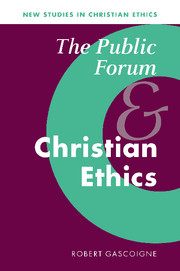Book contents
- Frontmatter
- Contents
- General editor's preface
- Acknowledgements
- Introduction
- 1 Revelation and reason in liberal societies
- 2 Revelation and a contemporary public ethics
- 3 The theology of revelation and Christian identity
- 4 The communication of Christian ethics in the public forum
- 5 Reconciling autonomy and community
- Select bibliography
- Index
4 - The communication of Christian ethics in the public forum
Published online by Cambridge University Press: 22 August 2009
- Frontmatter
- Contents
- General editor's preface
- Acknowledgements
- Introduction
- 1 Revelation and reason in liberal societies
- 2 Revelation and a contemporary public ethics
- 3 The theology of revelation and Christian identity
- 4 The communication of Christian ethics in the public forum
- 5 Reconciling autonomy and community
- Select bibliography
- Index
Summary
The previous chapter has developed a conception of Christian identity based in a theology of mediation of universality and particularity. It is now time to consider how this conception of Christian identity is expressed in ethical communication in the public forum, for the sake of maintaining and strengthening the sense of the worth of persons in community. Any conception of Christian identity must have communication at its core, in so far as all Christian identity is rooted in evangelization. For a theology of mediation, evangelization as communication has a particular concern for the potential for self-understanding and reciprocal learning inherent in the communicative process.
The specific emphasis of this study is on the nature of Christian ethical communication in the public forum of liberal and pluralist societies. In chapter 1, some of the fundamental features of such societies were highlighted, in particular liberalism's own problems of legitimation and the tensions between liberalism and particular revealed traditions. Chapter 2 addressed the various ways in which philosophy since Kant has attempted to ground the ethical concept of the worth of persons. Firstly, it offered an interpretation of the different ways in which the relationships between revelation, reason and ethics have been understood since Kant. Secondly, it presented a critical analysis of the ways in which Kant himself and neo-Kantian thought attempt to ground autonomy and ethical universality (a ‘kingdom of ends’) in various forms of rationality.
- Type
- Chapter
- Information
- The Public Forum and Christian Ethics , pp. 163 - 211Publisher: Cambridge University PressPrint publication year: 2000



